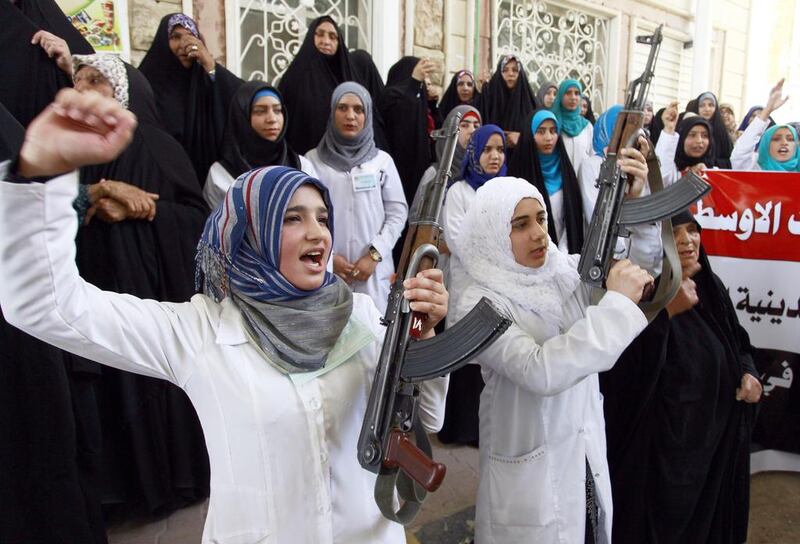BAGHDAD // The UAE yesterday recalled its ambassador to Baghdad and demanded an end to discrimination against Iraq’s Sunni minority as fighting continued to rage between Islamist insurgents and government forces.
The Ministry of Foreign Affairs voiced “serious concern” about “exclusionary and sectarian policies that marginalise essential components of the Iraqi people”.
The UAE warned that the policies of the Shiite-led government of prime minister Nouri Al Maliki would only “escalate political tension and jeopardise security”.
“The only way to salvage Iraq and protect its territorial integrity and stability is by adopting a consensual national approach that brings Iraqis together and does not exclude” any party, the ministry said.
Iraq asked the United States yesterday to launch airstrikes on fighters from ISIL, the Islamic State of Iraq and the Levant, who attacked the main oil refinery and seized more territory in the north in a week-long offensive that has brought them close to the capital.
But the Iraqi foreign minister Hoshyar Zebari admitted “a military approach will not be enough. We acknowledge the need for drastic political solutions”.
The US spent millions of dollars over several years training and arming a new Iraqi army after disbanding the Sunni-led force created by the late dictator Saddam Hussein.
Washington has already deployed an aircraft carrier to the Arabian Gulf and sent marines to bolster security at its embassy in Baghdad, but Barack Obama has insisted a return to combat in Iraq for US soldiers is not on the cards.
However, secretary of state John Kerry has said drone strikes could be used.
The Iraqi security spokesman Lt Gen Qassem Atta claimed security forces would regain full control of Tal Afar, a Shiite town in the north that lies along a strategic corridor to Syria, by this morning.
That would provide a base from which to launch operations to recapture Mosul.
With regional tensions rising, the Iranian president Hassan Rouhani said the Islamic republic “will do everything” to protect Shiite shrines in Iraqi cities against the militant assault.
The crisis, which has displaced hundreds of thousands of Iraqis, threatens to break the country apart, while the assault on Baiji oil refinery yesterday further spooked international oil markets.
The attack on the refinery complex, in Salaheddin province north of Baghdad, was launched before dawn.
Gen Atta said Iraqi forces managed to kill 40 militants and repel the attack, but that some tanks containing refined products caught fire.
The refinery was shut down and some employees evacuated on Tuesday because of a drop in demand caused by the militant drive.
The militants’ swift advance has sparked international alarm, with the UN’s envoy to Baghdad warning that the crisis was “life-threatening for Iraq”.
Analysts suggested the country could unravel, surviving at best as a federal state.
John Drake, an expert on Iraq with the British security group AKE, was asked if Iraq could remain united. “I don’t think it’s impossible, but it is highly unlikely,” was his verdict.
Militants moved into the Shiite Turkmen area of Bashir in Kirkuk province yesterday and also seized three villages in Salaheddin province.
In a bid to see off the offensive, Mr Al Maliki sacked several top security commanders on Tuesday evening, then stood alongside several of his main rivals in a rare display of unity among Iraq’s fractious political leaders.
The dismissals came after soldiers and police fled en masse as insurgents swept into Mosul, a city of two million, on June 10.
Some abandoned their vehicles and uniforms when faced with the insurgents, who are led by ISIL fighters but also include loyalists of Saddam Hussein.
After taking Mosul, militants captured a major chunk of mainly Sunni Arab territory stretching towards the capital.
Despite security forces’ initial poor performance, Pentagon spokesman Rear Admiral John Kirby said Iraqi troops, with help from Shiite volunteers, were “stiffening their resistance” around Baghdad.
* Associated Press and Agence France-Presse





